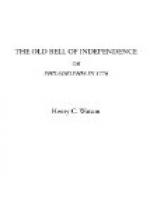“I recollect a scene I beheld in the next hut to the one in which I messed. An old friend, named Josiah Jones, was dying. He was lying on a scant straw bed, with nothing but rags to cover him. He had been sick for several days, but wouldn’t go under the doctor’s hands, as he always said it was like going into battle, certain of being killed. One day, when we had no notion of anything of the kind, Josiah called out to us, as we sat talking near his bed, that he was dying, and wanted us to pray for him. We were all anxious to do anything for the man, for we loved him as a brother; but as for praying, we didn’t exactly know how to go about it. To get clear of the service, I ran to obtain the poor fellow a drink of water to moisten his parched lips.
“While the rest were standing about, not knowing what to do, some one heard the voice of General Washington in the next hut, where he was comforting some poor wretches who had their feet almost frozen off. Directly, he came to our door, and one of the men went and told him the state of things. Now, you see, a commander-in-chief might have been justified in being angry that the regulations for the sick had been disobeyed, and have turned away; but he was a nobler sort of man than could do that. He entered the hut, and went up to poor Josiah, and asked him how he was. Josiah told him that he felt as if he was dying, and wanted some one to pray for him. Washington saw that a doctor could do the man no good, and he knelt on the ground by him and prayed. We all knelt down too; we couldn’t help it. An old comrade was dying, away from his home and friends, and there was our general kneeling by him, with his face turned towards heaven, looking, I thought, like an angel’s. Well, he prayed for Heaven to have mercy on the dying man’s soul; to pardon his sins; and to take him to Himself: and then he prayed for us all. Before the prayer was concluded, Josiah’s spirit had fled, and his body was cold and stiff. Washington felt the brow of the poor fellow, and, seeing that his life was out, gave the men directions how to dispose of the corpse, and then left us to visit the other parts of the camp.”
“That was, indeed, noble conduct,” said young Harmar. “Did he ever speak to you afterwards about violating the regulations of the army?”
“No,” replied Wilson. “He knew that strict discipline could not be, and should not have been maintained in that camp. He was satisfied if we were true to the cause amid all our sufferings.”
[ Illustration: Washington’s prayer for the dying soldier.]
“Praying at the death-bed of a private,” mused Smith aloud. “Well, I might have conjectured what he would do in such a case, from what I saw of him. I wonder if history ever spoke of a greater and better man?”
Young Mr. Harmar here felt inclined to launch out into an elaborate panegyric on the character of Washington, but reflected that it might be out of place, and therefore contented himself with remarking, “We shall ne’er look upon his like again.”




